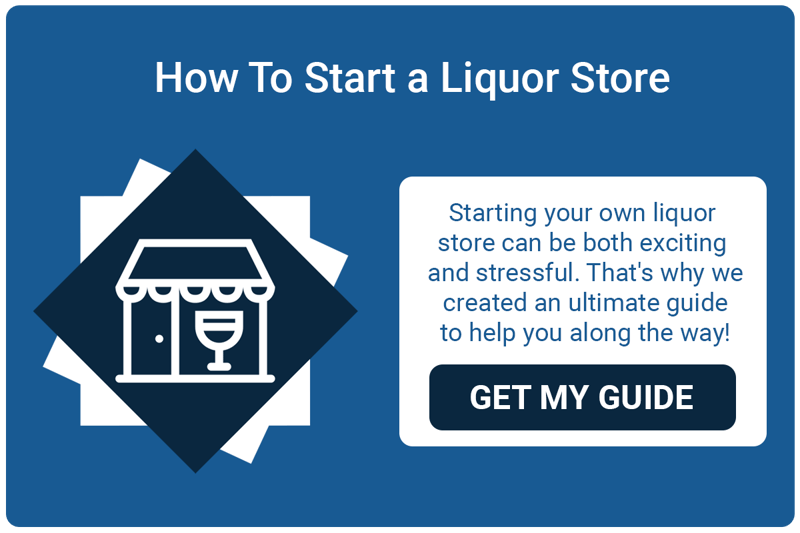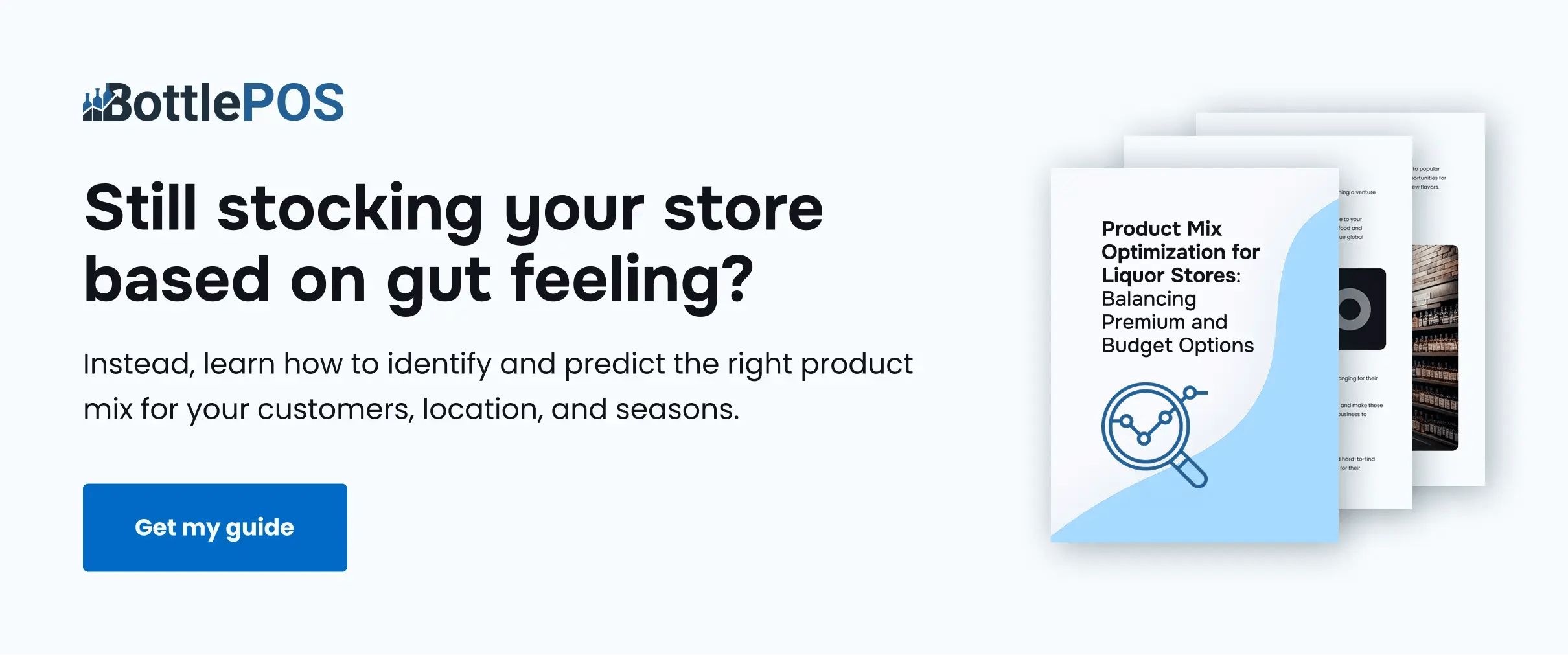Asking, “How much does it cost to open a liquor store?” is like asking, “How much does a bottle of wine cost?”
It depends.
If you’ve never bought a bottle of wine (or opened a liquor store) before, you might not have a reasonable guess, which is perfectly understandable.
Let us save you some time: The average cost to open a liquor store in America is typically between $100,000 and $250,000.
If that’s all the information you came for, great! We’re glad we could help — but if you want a more detailed breakdown of liquor store startup costs, then read on.

How Much Does It Cost To Open a Liquor Store: The 3 Types of Costs
Opening a liquor store involves various costs that can be divided into three general categories.
- Upfront costs (avg. $105,000): These are the costs you’ll pay just to get started. This includes initial deposits on rent, permits, alcohol licenses, store setup, and starting inventory.
- Ongoing costs (avg. $27,000): These are the various recurring monthly costs of running a liquor business, including payroll, insurance, marketing, advertising, inventory replenishment, software subscriptions, and rent.
- Store updates and admin (variable): Finally, there are the costs that are less easy to plan for. These include expenses like updating your point of sale (POS) hardware, time spent on daily tasks (interviewing, invoicing, etc.), shrinkage, and other expenses.
4 Upfront Costs of Opening a Liquor Store
When you write your liquor store business plan, these are the most important upfront costs to consider.
1. Deposit for Rent: $8,000 – $10,000
Retail rent has unfortunately risen over the last few years, creating higher upfront costs for retailers. The average commercial rent in the U.S. is about $29 per square foot/year. So, if your store is 2,000 square feet, you can expect to pay about $58,000 per year or $4,800 monthly.
Most landlords will require one month’s rent plus a security deposit (typically equivalent to another one or two month’s rent) upfront.
2. Alcohol Licenses and Business Permits: $3,000 – $10,000
To run a liquor store legally in the U.S., you’ll need a business license, appropriate zoning permits, and last but not least, an alcohol license.
Business license costs are fairly straightforward, ranging from as low as $25 to $500 on the high end. On average, expect to pay a few hundred dollars. You’ll also need to register your business, which is usually a few hundred dollars.
Getting an alcohol license, however, is where it gets a lot trickier. Alcohol laws are entirely up to local governments, meaning there are wild variations in licensing costs and rules between states, counties, and cities.

On average, an alcohol license costs between $1,500 and $3,000. However, costs can be in the tens of thousands.
Check with your local government or state ABC board to know exactly what the requirements are in your area.
3. Initial Inventory Costs: $60,000 – $100,000
Of course, you can’t run a liquor store without any liquor to sell, so you’ll need to purchase your initial inventory. Having a varied inventory is vital for attracting new customers and keeping them coming back for more.
These costs can vary depending on the size of your store, but expect to pay between $60,000 and $100,000.
When considering your initial inventory purchases, try to keep your unique value proposition in mind. If a local competitor who specializes in a large selection of craft beer, it might not be worth trying to beat them in that area (at least at first).
Related Read: Liquor Store Inventory: A Quick Beginner’s Guide
Being strategic about your selection can help you reduce what you spend on initial inventory (to an extent), however, it will still be one of your highest upfront costs.
Once you have your initial inventory, you’re likely to spend anywhere from $15,000 to $60,000 monthly on replenishment.

4. Store Setup: $4,000 – $15,000
There will also be some initial upfront costs in getting your store ready, whether that’s installing counters and shelving, painting the walls, or putting up signage.
These costs can vary significantly depending on what you have to work with and whether the building needs any significant repairs or updates.
Experts say this cost can range from a few thousand dollars to tens of thousands based on your needs. For the sake of argument, we’ll put the cost at around $10,000 assuming you need shelving, some minor renovations, and basic signage.
This is a great stage to consider your liquor store layout. Consider what items people will see as they walk in, how they’ll navigate the store, and what kind of spaces you want to leverage for sale and promotional items.
4 Ongoing Costs of Running a Liquor Store
When you open a liquor store, you can’t just think about your upfront costs. You need to budget for your ongoing costs until you make enough money to break even.
Here are the main costs to consider.
1. Staffing Costs ($2,400+ per month per full-time employee)
Let’s face it, you can’t run your liquor store alone, and that means hiring staff. Even though it’ll be one of your highest ongoing costs, the value of hiring and retaining great staff can’t be overstated.
As an estimate, let’s take the national average minimum wage (approx. $12/hr) and multiply it by 150 hours, which is the average number of hours full-time employees in the U.S. work per month.
Under the above conditions, the total cost per employee is $1,800 per month. However, you may choose to pay a higher rate to attract better talent or have more part-time workers.
Related Read: Point of Sale Training for Liquor Stores: 6 Tips
If you choose to pay for 50 percent of your employees' health benefits, you can expect to pay roughly $4,000 per year per employee, which is $333 per month per employee.
While these costs might seem high at first, remember that high turnover costs can add up since you’ll have to spend time and money recruiting and training new employees.
2. Business Insurance ($100 per month)
Your business will also need to be insured, and general liability coverage costs an average of about $100 monthly. However, depending on the size of your business and the number of employees, these costs may rise.
Many insurers also offer additional coverage for property insurance, product liability, cyber insurance, and other areas.
If you are looking for a more comprehensive insurance plan, it can be a good idea to get a BOP (Business Owners Policy) which bundles different types of insurance together at a discount.
3. Marketing and Advertising ($10 – $5,000)
Marketing isn’t necessarily a required expense, and investing time and money into it may be the last thing on your mind when opening a new store.
However, ignoring it entirely would be a huge mistake. A solid liquor store marketing plan will help you:
- Attract new customers
- Drive repeat business
- Boost sales
Your marketing doesn’t have to be anything elaborate at first, and can be as simple as setting up a user-friendly website and social media page. You should also update your Google Business Profile listing to ensure you appear on local search and Google Maps.
Once you’re up and running, a healthy marketing budget is between 7% and 8% of your store’s revenue. This can be spent maintaining your website and social media, paying for ads, or sending out SMS and email newsletters.
Related Read: Alcohol Promotion 101: 5 Liquor Store Marketing Ideas and Tips
4. Utilities and Subscriptions ($600 – $1,500)
You can’t sell much liquor if you can’t keep the lights on and the fridges running. The cost of utilities will vary, but on average, expect to pay between $500 and $1,000 per month.
As part of your utilities, you’ll also want to budget out costs for things like:
- Electricity
- Water
- Internet
- Gas
- Waste management
- Security
There are various ways you can save on your electricity bill including:
- Installing sensors that dim or turn off lights in less trafficked areas (best done outside of peak hours)
- Routinely checking the seals on your refrigerators and freezers
- Using LED lights and other energy-efficient lighting sources
While these costs are unavoidable, remember to compare providers periodically. You could even get a discount for switching providers!
5. POS Hardware and Software ($100 — $2,000)
In addition to your utilities, you’ll likely be paying for a specialized point of sale system to help you manage the store. More than just processing payments, the right point of sale system will help you:
- Track and manage inventory
- Invoice and manage suppliers
- Manage customer loyalty programs
- Analyze sales data and inventory reports
- Spot shrinkage sources
- Stay compliant using ID scanners and age-verification tools
You’ll also need the right POS hardware, including touch screens, receipt printers, barcode scanners, and more.
Subscription prices for a liquor store POS system can vary depending on the hardware you need, but expect to pay between $100 and $2000 per month.
Many common problems liquor stores face can be solved using technology that’s tailored to their industry. So while investing in generic systems to save money might be tempting, we highly recommend using a system specifically built for liquor store owners.
Store Updates and Admin
These costs are harder to account for because you likely won’t know what you need until you’ve been in business for a few months. However, here are some examples of everyday situations our customers face:
- Need to upgrade systems: Many people start with a basic POS system or inherit one from a previous owner only to find it’s not a good fit for their business.
- Need to cut down on labor: You may find that you’re spending too much time on stocking or invoicing and need to invest in new software or more staff.
- Shrinkage: A persistent shrinkage problem could require investing more in store security or new software.
- E-commerce: If you decide to sell online, you’ll need to set up specialized systems to connect with your inventory.
Remember, running a liquor store is a process of continuous improvement. So leave some extra space in your budget to iron out any kinks you find along the way.
That said, the better your business plan, the fewer significant changes you’ll have to make.
Ready To Open Your Liquor Store? We’re Here To Help
Opening a liquor store may not be cheap, but it’s worth it. A liquor store is still a great investment despite rising prices and economic uncertainty. Remember:
- The liquor business is recession-proof
- Products are shelf stable and won’t expire quickly (less chance of spoilage)
- There’s year-round demand
- There’s relatively low competition due to limited licenses per area
- You have a replicable business model if you decide to open multiple locations
If you’re ready to invest in your business, make sure you’re using the right technology. Bottle POS was built by liquor industry professionals to help small and independent liquor store owners overcome unique industry challenges and find success.
Contact one of our liquor store experts today to learn more.
